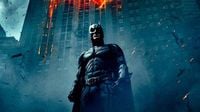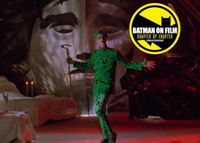In the world of cinematic criticism, few figures stand out like Roger Ebert, whose insightful reviews shaped the tastes of moviegoers for decades. Before his death in 2013, Ebert reviewed seven Batman movies and identified two that resonated with him more than the rest: Batman Begins (2005) and The Dark Knight (2008). Ebert's profound appreciation for these films stemmed from their emotional depth, storytelling, and character development, making them his clear favorites in a franchise that has seen numerous iterations.
Tim Burton's Batman (1989) and its sequel Batman Returns (1992)—both starring Michael Keaton as the iconic superhero—marked the beginning of Batman’s cinematic journey. Ebert granted these early films modest ratings, awarding two stars to Batman and Batman Returns, and two-and-a-half stars to Batman Forever (1995) and two stars to Batman and Robin (1997). Burton's portrayal created a dark and stylized Gotham but lacked the emotional complexity Ebert craved.
The reboot began with Christopher Nolan's Batman Begins, heralding a new era for the franchise. Ebert, who often expressed his admiration for Batman's darker narrative and adult themes, wrote, "This is at last the Batman movie I’ve been waiting for." His review emphasized how the film expanded on Batman's character, incorporating a more serious and layered portrayal through Christian Bale's performance. Ebert noted, "Bale is just right for this emerging version of Batman," capturing the character's complexity whilst juxtaposing it with Bale's prior role in The Machinist, where he appeared emaciated, highlighting the transformation into Batman's muscular physique.
In 2008, Ebert praised The Dark Knight as a monumental achievement, describing it as a film that transcended its comic book origins. He wrote, "Batman isn’t a comic book anymore. Christopher Nolan’s The Dark Knight is a haunted film that leaps beyond its origins and becomes an engrossing tragedy." Ebert was captivated by Heath Ledger's legendary portrayal of the Joker, recognizing the depth of the characters and powerful performances throughout the film. The critic asserted that the film delivered a poignant story, remarking, "It creates characters we come to care about. That’s because of the performances, because of the direction, because of the writing, and because of the superlative technical quality of the entire production."
Nolan’s masterful direction led to a balance between action and emotional nuance, which Ebert highlighted as essential. He praised not only Ledger’s performance but also the impressive cast, including Aaron Eckhart’s Harvey Dent and Michael Caine’s Alfred Pennyworth, deeming their performances as beautiful and impactful. Ebert lauded Nolan’s capabilities to weave in thrilling action without allowing special effects to overshadow the narrative, stating that the film achieved a deeper connection between the audience and the characters.
Following the success of The Dark Knight, Nolan's final installment, The Dark Knight Rises (2012), received a three-star review from Ebert. Although Ebert noted that it didn’t quite match the high bar set by its predecessor due to a less compelling villain and a muddled narrative, he still called it "an honorable finale" to the trilogy. This final installment showcased how far the character of Batman had evolved since its early cinematic outings.
Both Batman Begins and The Dark Knight have been lauded not only by Ebert but also by audiences and critics alike. Batman Begins scored an impressive 85% approval rating on Rotten Tomatoes while its sequel boasts an even higher rating of 94%. These figures underscore the films' acclaim and their significant impact on the superhero genre. Ebert's reflections on these movies highlight an appreciation for the complexities of storytelling, showing that superhero films can elicit more than just thrills and excitement.
Roger Ebert's reviews continue to resonate, as they remind audiences of the high standards he held for storytelling in film. His insights draw attention to the emotional weight that can be achieved in a genre often dismissed as merely entertainment. Ebert deftly pointed out that Nolan’s reimagination of the Batman franchise freed the character "to be a canvas for a broader scope of human emotion." Today, fans can experience Ebert's beloved Batman Begins and The Dark Knight on streaming platforms, ensuring that his influential reviews live on through the films he cherished.





